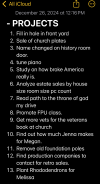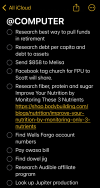KatyP
Registered
I use Things to organize all my lists. So yes I have the next action in each project, but then I have to mark those specific actions that I decide to do today with "Today" in order to see them in the "Today" list. So I either can search for them by some context or I can look through the projets and see what the next actions are for each one and then select them for today. I would have to do several searches for different contexts that I can get done today. Some I might just glance through the project list and decide which ones are important for me to make some progress on that day, and then mark the next actions of those projects with "Today".So where do you put the very next action for a project? You shouldn't be looking so much at projects as the next action. I try to only look at projects during my weekly review. Does your system integrate personal and professional? And the contexts would still work. There are some things you can only do on the phone. (Calls and Texts). @Computer for me is anything that can be done on the computer or phone that is computer-like. It's a little more fuzzy but I put that in @Computer. Do you "work" the farm like a job? I mean go out to the farm and work 8 hours? I'm not a fan of time blocking but maybe you could do that. Then do the @farm stuff @farm. Do you put day specific items on your calendar?
But I need to be aware of pending projects in all these context to decide how to direct my time that day. Like do I need to get some things done inside the house? Or maybe I need to go start on a farm project outside. Or I need to make some phone calls or do something on the computer.
That is why you need to put your very next action on you N/A list. It appears you are trying to do projects not next actions. GTD theory is you can't do projects you can only do the very next action to move that project forward. I'm in no way trying to suggest I know your business but I'm guessing the following example might be close.
Project-Plant 16 acres of corn.
@Farm-Get tractor and Plow 16 acres on the North Side.
That's it. I don't write down any next action til I've completed the first. I may do several next actions on that project. when I stop I write down the very next action and I can pick up the project where I left off. For example, If you finish plowing and stop for the day, Your next action could be @Farm- fertilize 16 acres.
And don't neglect the @Waiting For context. Sometimes you can still move a project forward with a waiting for item. Sometimes your project is on hold til the waiting for item is taken care of.
Hope this helps.
>Do you "work" the farm like a job? I mean go out to the farm and work 8 hours?
Only on days I am loading for farmers markets, the rest of the time I'm either away 4 days out of the week doing 10 farmers markets markets per week and staying in the city, or I'm managing my employees at the farm. So whenever I am at home/farm, I need to make sure I don't miss anything that's important for me to do while I am there, regardless of context. Sometimes it's something physical there that's time sensitive, or I need to do something on my computer, or make a phone call while I have some time to do that at home.
I work 7 days a week. Right now I'm on vacation in hawaii and I am working a good chunk of the time doing administrative work and bookkeeping to try to catch up.
Posting about this GTD dilemma was on my Next Actions list. LOL I've been meaning to get some help on this for a while.
>Do you put day specific items on your calendar?
Only for specific appointments. The rest of the time is pretty chaotic. I might be doing different things on different days.
>That is why you need to put your very next action on you N/A list. It appears you are trying to do projects not next actions.
In Things I can search for Next Actions, but the problem is that I have so many pending projects that there are that many next actions that overwhelm me. So if I have 100 pending project, I'll have 100 pending Next Actions, and a good chunk of them will be things I could possibly do when I am home because I'm at home/farm and have access to computer and phone. But it's a lot to choose from when I have very limited time at home. That's the overwhelming part. Like everywhere I look in the house or farm, there are open loops. Every room, every drawer, every area things are grown, every storage area, something needs to be done. And when I look at the next actions, my head just wants to explode. Just the time it takes to review the Next Actions list and mark the things with "Today" becomes too much to do every day. I become overwhelmed and stop doing it.
>I don't write down any next action til I've completed the first.
But what if you complete the one next action for one project that week but you really need to also make more progress on that project later that week. Do you add another next action into that project right away?
Sometimes I have a couple things that need to be done in a project that are not dependant on the completion of the other. So sometimes I have more than one action because it's important to get those things done.
I'm starting to realize from talking to everyone here that my current projects need to be what I am actually going to be working on that week and nothing else. And anything I am going to be working on this month is going into Someday Soon, and will be reviews weekly to pull things into the active projects for each week. So that when I'm searching for Next Actions, they are only next actions from the projects I really need to do something about that week and nothing more.
Do you add Next Actions into Projects that are in your Someday/Maybe list? Or those just stay blank until you move them into current projects?
The other thing that is hard for me to track are all the organizational projects. I want to be making some progress on decluttering and organizing and cleaning stuff, but there are SOOOOOO many areas, rooms, drawers, shelves, sheds, greenhouses, vehicles, garages, tools, grow areas, grow building, bins, boxes.... I can't even tell you... it's absolute madness... . I have a seperate Area of Focus for that kind of stuff, and break the Projects out into rooms or storage areas. But a room could have cabinets and dressers and bins and each drawer of a dresser is like it's own project.
So maybe all of those need to stay in some kind of Someday/Maybe list and I just choose one per week and pull that into the Current Project with one Next Action. And then I'm only committing myself to one or two organizations task per week and no more.
Why do i make my life so complicated??? LOL.
People tell me that I am pretty crazy to attempt to do 10 farmers markets per week and mange like 10 employees and work 7 days a week. And I also think I probably have ADHD, which makes all this stuff that I am already trying to do that must more overwhelming.
I've been fumbling around with GTD for over 20 years. I am determined to get it more functional this upcoming year. I don't think I can manage this farming chaos if I don't. My stress level is off the charts.





